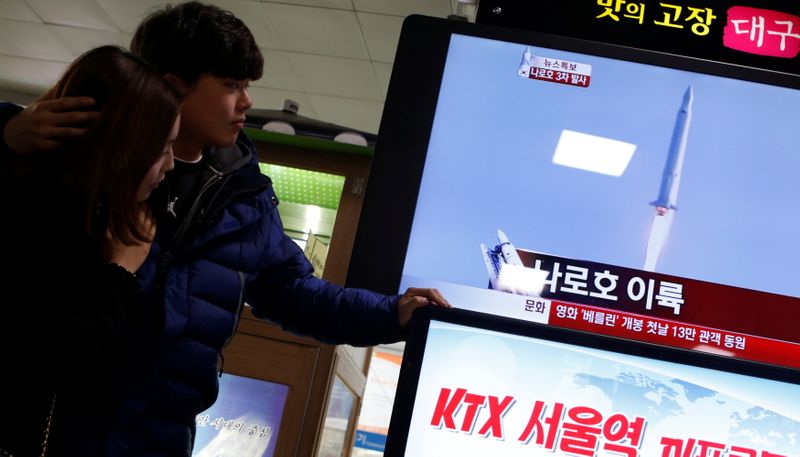By Josh Smith
SEOUL (Reuters) - South Korea plans to test its first domestically produced space launch vehicle next week, a major step toward jumpstarting the country’s space programme and achieving ambitious goals in 6G networks, spy satellites, and even lunar probes.
If all goes well, the three-stage NURI rocket, designed by the Korea Aerospace Research Institute (KARI) to eventually put 1.5-ton payloads into orbit 600 to 800km above the Earth, will carry a dummy satellite into space on Thursday.
South Korea’s last such booster, launched in 2013 after multiple delays and several failed tests, was jointly developed with Russia.
The new KSLV-II NURI has solely Korean rocket technologies, and is the country's first domestically built space launch vehicle, said Han Sang-yeop, director of KARI's Launcher Reliability Safety Quality Assurance Division.
"Having its own launch vehicle gives a country the flexibility of payload types and launch schedule," he told Reuters in an email.
MILITARY AND CIVILIAN BENEFITS
It also gives the country more control over “confidential payloads” it may want to send into orbit, Han said.
That will be important for South Korea’s plans to launch surveillance satellites into orbit, in what national security officials have called a constellation of “unblinking eyes” to monitor North Korea.
So far, South Korea has remained almost totally reliant on the United States for satellite intelligence on its northern neighbour.
In 2020 a Falcon 9 rocket from the U.S. firm Space X carried South Korea’s first dedicated military communications satellite into orbit from the Kennedy Space Center in Florida.
NURI is also key to South Korean plans to eventually build a Korean satellite-based navigation system and a 6G communications network.
“The program is designed not only to support government projects, but also commercial activity,” Oh Seung-hyub, director of the Launcher Propulsion System Development Division, told a briefing on Tuesday.
South Korea is working with the United States on a lunar orbiter, and hopes to land a probe on the moon by 2030.
TRIAL LAUNCH
Given problems with previous launches, Han and other planners said they have prepared for the worst.
The launch day may be changed at the last minute if weather or technical problems arise; the craft will carry a self-destruct mechanism to destroy it if it appears it won’t reach orbit; and media won’t be allowed to observe the test directly.
At least four test launches are planned before the rocket will be considered reliable enough to carry a real payload.
According to pre-launch briefing slides, the rocket’s planned path will take it southeast from its launch site on the south coast of the Korean peninsula, threading its way over the ocean on a trajectory aimed at avoiding flying over Japan, Indonesia, the Philippines, and other major land masses.
"This upcoming launch may be remembered as the hope and achievement of Korean rocketry historically no matter the launch is successful or not," Han told Reuters.
SENSITIVE TECHNOLOGY
Space rockets on the Korean peninsula have been fraught with concerns over their potential use for military purposes, leaving South Korea’s efforts lagging more capable programmes in China and Japan.
"Modern rocketry in Korea couldn't devote its capability much in R&D of rockets because of long-standing political issues," Han said.
The United States has viewed North Korea’s own satellite launch vehicles as testbeds for nuclear-tipped intercontinental ballistic missile technology. A North Korean space launch in 2012 helped lead to the breakdown of a deal with the United States.
"North Korea, of course, will not look favourably on South Korea’s rapidly advancing space capabilities, which are far more technologically advanced than those possessed by the North," said James Clay Moltz, a space systems expert at the U.S. Naval Postgraduate School.
South Korea’s push into space comes as it speeds ahead with its own military ballistic missile systems after agreeing with the United States this year to end all bilateral restrictions on them.
"There is no concern on military applications in NURI launch vehicle development," said Chang Young-keun, a missile expert at the Korea Aerospace University. Unlike the liquid-fuelled NURI, South Korea’s military missiles use solid fuel, which is better for weapons, he added.

South Korea is not seen as a "threat" by either Russia or China, so it seems unlikely to affect their space programs, which are already highly militarized, Moltz said.
"Many space launch technologies are inherently dual-use," he said, but noted that he hopes NURI’s development will "not lead to an arms race in space, but instead a safer ‘information race’" where South Korea has better intelligence to head off any future crisis.